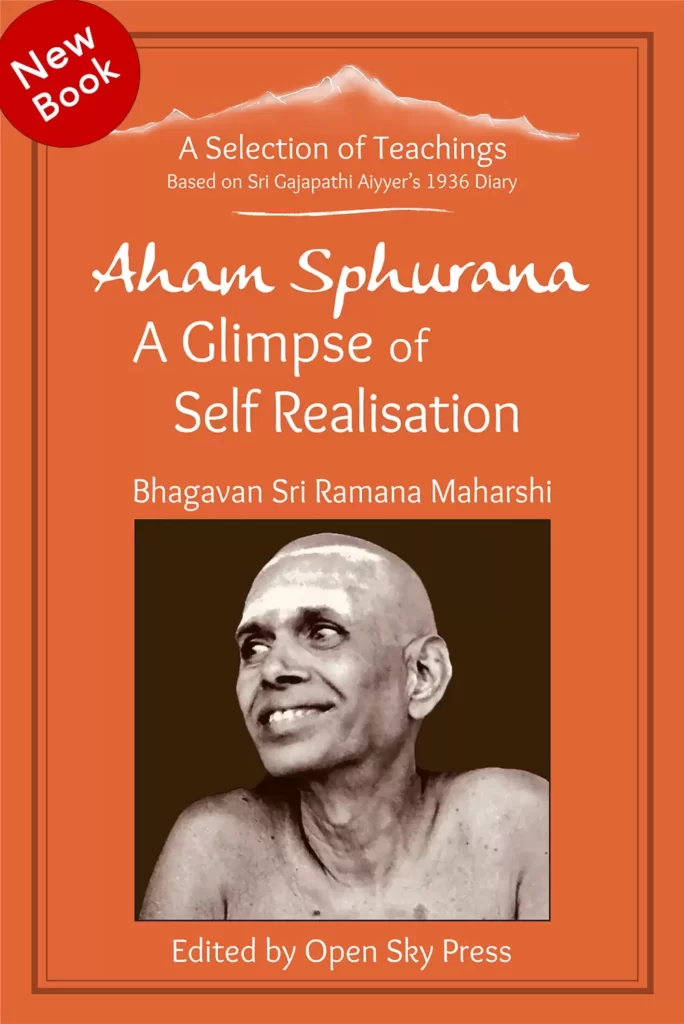
Aham Sphurana
A Glimpse of Self Realisation
New Book about Sri Ramana Maharshi

Available Worldwide
On www.openskypress.com and Amazon:

“In my opinion, Aham Sphurana, a Glimpse of Self Realisation, will become a Treasure Trove of Wisdom to the Seekers of Truth in general, and particularly to the devotees of Bhagavan.”
Swami Hamsananda – Athithi Ashram, Tiruvannamalai
The Play Around Bhagavan
25th August, 1936
Today early-morning when I entered the ashram, I observed that at the foot of the iluppai-tree near the road was the Aghori. Although it was dark, I could discern by the moonlight that it was he, for the contortions of his bodily structure is readily recognizable. He seemed to be sleeping there. I was not curious to investigate what he was doing there and proceeded on into the Hall. Bhagavan was sitting bolt upright on the couch as usual [I do not think it is possible for him to sleep, although on occasion he does close his eyes for a time].
His eyes stared into vacant space, unblinking, unmoving, looking but not seeing. It might have been a sculpture. I prostrated and sat down to meditate. Moments later, I heard the sound of someone traversing the Hall’s entrance. I did not trouble to open my eyes, assuming it to be another devotee. But when fur brushed against my body, I flinched in surprise. It was Lakshmi, Bhagavan’s pet cow. She frequently came to the Hall and the Maharshi would feed her with whatever devotees had brought that day as offering. Invariably she would come everyday before the 11AM luncheon, and standbefore the Maharshi. He would speak a few kind words to her, pat and stroke her head, allow her to devour much of the offerings made since the morning of that day, and then lead her out of the Hall.
Often she would return in the evening, standing before the Sofa determined to attract his attention, until the master turned his gaze towards her and showered his Love, by caressing her and talking soothingly to her. If he was occupied with something else for too long a span of time, her patience would run out, and she would gently nudgethe Sofa with her horns. Sometimes the master seemed too abstracted to pay her any attention, but she did not seem to be the sort to take no for an answer; she would approach closer to the Sofa and start licking his body repeatedly; the master would not seem annoyed at all. Many in the ashram believe she possesses the ability to telepathically communicate with the Maharshi to and fro.
She is an outstanding example of the fact that none who approaches the master with bhakti is turned away. Seeing the blessed animal here at this hour, I wondered how she had broken out of her tether, for the cows were let off to graze only well after sunrise. Bhagavan also seemed nonplussed. He caught hold of her horns, pressed his forehead against hers, and, staring fixedly into her eyes, asked quietly, ‘Enna Lakshmi?’. After a few minutes, he asked me urgently, ‘Dei paiyya! Did you see anyone hereabouts whilst you were coming in?’. ‘No. But that Purampoekku chamiyar was lying down near the road…’ The master rose at once. ‘Why didn’t you tell me? Where?‘ he asked, proceeding to leave the Hall, Lakshmi following. ‘Sorry, he is lying near the iluppai-tree. Let me show Bhagavan.’
We went to the tree. Lakshmi nudged the man’s torso gently with her horns, but he did not stir. He was lying upturned upon the earth. The Maharshi gently motioned for her to withdraw herself and she went away. The master sprinkled some water on the Aghori’s head from his kamandalam [ ]. He gave a twitch and then lay still. Thesarvadhikari was nowhere to be seen. I asked, ‘Shall I awake someone in the ashram?’ The master said, ‘No. Catch hold of his feet.‘ I did not understand. Bhagavan rolled the old sadhu’s body over, caught my hands in his, pressed them over the alleged centenarian’s tibiae, just above his ankles, himself caught hold of the humeri, and commanded, ‘Lift!’. As to what happened next, I have no recollection. The moment the master’s divine touch descended upon me like the proverbial manna from heaven, a thrill of pure ecstasy shot out from the Heart to roast every cell in my body, and I was quiteconsciously drowned in it, remaining asleep to sensory perceptions for the duration of the experience.
When the violent surge of exhilarating bliss had passed, I found myself inside a hut, crouching by the side of a coconut-stem thatched wall. Bhagawan was nowhere to be seen. The Aghori was sitting opposite to me, eyes looking blood-shot and mirthless as usual. I noticed that he was no longer holding up his hand; but apparently it had stayed in the raised position for so long that now in holding it in a regular position he was not being entirely successful. The elbow jutted akimbo from the body, and thewhole of the skin covering that extremity had a glaucous, gelatinous appearance. Together with his body’s other deformities and his utterly bedraggled, matted and grime-permeated hair and beard, this made his appearance quite a gruesome sight.
There was a small fire burning in a charcoal-brazier in the corner of the hut, and this was the only light for me by which to take stock of these observations: the Sun was yet to rise. I tried to rise, but the intense experience of bliss given by Bhagavan had made my body quite enervated. I felt my head spin and sank to the floor. But a brief glimpse, partaken by me just before my vision had swum, forcing me collapse back onto the floor, through a square-shaped gap left in the thatchwork. I realised I must be some way up on the Hill, for I could see rocks and shrubs by the moonlight. I could also hear faintly the sound of trickling water. I failed to muster the courage to ask the Aghori where we were.
Absently I stared at the viscid appearance of the skin on the Aghori’s atrophied arm, shining with an obscenely unsightly glare in the dim light of the charcoal fire. I am startled to hear the sound of his voice suddenly hurled at me. ‘Yes, I haveunhitched my hand. Outside the Temple of Tiruvottriyoure I met a Moslem, an Urdhoo-speaking boy. As soon as he noticed me he pursued me, calling out,” தரே்வஷ்பாப◌ா ! தரே்வஷ்பாப◌ா ! Please stop….”. He wanted to become my disciple. Initially I was reluctant to have anything to do with him. But he seemed to be a tapasvin, just like you. In fact, he also would be about your age… I tried to drive him away, but he went on pleading with me… When I tried to run away from him, he started weeping. Then I felt sorry for him and relented. He told me he was a fisherman’s son who had come walking all the way from his village, Umkasre. He had had a dream wherein Meher Baba hadbeckoned him and told him how to reach him. He had journeyed by walk all the way from his distant country, and years later finally reached Meher Baba, who received him with profuse joy.
He stayed with Meher Baba for three years. One fine day, the Baba told him, ‘Go to the following village near Madras and await your master outside the temple there. He alone can help you. You can identify him by his long, matted hair and beard and his arm held aloft in the air.’, and handed him a slip of paper on which the words “Tiruvottriyoure- Madras” were written in various tongues. The boy had become upset at being asked to leave, but the Baba told him, ‘After being initiated into repetition ofthe sacred-word, you may come back here.’ So the boy had made his way toTiruvottriyoure, again only on foot.
I took pity on him and agreed to his entreaties to be permitted to keep me company as long as I stayed in that village. Then, as soon as I reached the Temple-premises and entered her shrine, Mother Tripurasundari’s voice said I may there afterwards give up my vow of keeping my hand aloft. That boy has now taken it up instead…’ I said, ‘Yes, I am glad to hear it…’. The sadhu continued, ‘For days I sat outside the Temple and fixed my mind on the image of my beloved, Tripurasundari.Finally the voice said I was now ready for nirgunopasana.[ ] After that, try as I might, the image of the Goddess would not appear in my mind. So I have come back to Bhagavan.
At the time of my departure from the place, I gave the boy manra-diksha of “Om Sai Shri Sai Jayajaya Sai.” I told him to repeat it 108 lakh times, and that if he did so he would obtain the merit of having stayed at the sacred feet of Sai-maula for 25 years. Then I bade him return to Meher Baba. He asked me where I was going. I replied I was going so that I would undergo irrevocable absorption in the lotus feet of Ramana Bhagavan. For some reason the name seemed to strike a fascinated chord in him and he also wanted to come with me. I said to him, ‘First finish chanting the incantation I have taught you the requisite number of times and then you may come to Bhagavan.’ He asked where Bhagavan may be found.
I loudly pronounced ‘Tiruvannamalai’ thrice in his right ear, and, leaving him, came away here to surrender once and for all at the feet of my sweet Lord Ramana Bhagawan…’ By now I was able to stand and move about; the Sun had also risen. As amark of respect I prostrated to the Aghori and was about to leave the hut when an emaciated-looking sannyasi entered, carrying a small brass pot in hand. He seemed palpably relieved to see the Aghori stationed in a seated posture; he smiled at me and asked me to stand put. The pot was handed to the Aghori, who raised it high above his head and poured some of the contents into his mouth without bothering to inspect what they might be; then the pot came to me and I was told I was at liberty to consume in full what was therein.
It was பானகநீர◌், and I devoured the fragrant liquid with immense relish. Thereupon I asked the sannyasi whether Bhagavan had sent him here. He replied, seemingly puzzled, ‘Yes; why are you asking? He was telling me what to do only with you seated here…’. I replied politely, ‘Yes, yes…’, respectfully paid my obeisance’s to them, and left. Within a minute or two of climbing downwards, I espied a familiar rivulet, and it became obvious to me where I was. I tucked-up my dhoti, waded into a shallow, rock-paved, cuboidal tank, got out on the other side, and followed the tiny stream on its course down the Hill, soon arriving at pandava-theertham. I marvelled to think of how Bagavan must have not only carried the Aghori all the way up this remotely frequented path, but also somehow made me co-operate in the effort, despite my unconscious [to the world] state.
The question was why he had taken the trouble. Accommodation could have easily enough been found for him in Palakoththu. And who was that cheerful sannyasi, who seemed to live at the hut erected at that unlikely spot? With these questions in mind, I proceeded swiftly to the ashram. Entering the ashram, I chanced upon Bhagavan’s rudraksha adorned attendant sitting alone at the base of the iluppai-tree. Thinking he was waiting there to complete some errand for Bagavan, I passed on. I had been right in my thought, albeit in an unforeseen way. As soon as I entered, theattendant jumped up like a shot fired from a musket. ‘Wait, wait!’, he said ebulliently, ‘Proceed no more. The master has asked you to go back to your room and return only early in the morning tomorrow.’
‘I will just go and tell him.’ ‘That is just what I am instructed not to permit you to do!’ he said timorously. ‘I am waiting here nervously for the past hour, like a statue, lest you slip pass unobtrusively by me…’ He could not be coerced, and I had to relent. I pretended to leave. Then the thought of doubling-back into the Hall throughPalakoththu occurred to me. But first I proceeded towards the direction of the town, because I imagined I could feel the attendant’s eyes screwed to the back of my skull. When I thought it safe, near the Dakshinamurti Mandapam, I stopped, and turned- to stare straight into the bemused eyes of the grinning attendant! ‘Poe daa!’ he said mirthfully.
So I slowly walked away from him. Then another idea struck me; I halted at the commencement of the path lying to one’s penultimate left before Agni-theertham; I looked over my shoulder but saw nobody; thus I joyously rushed toward Palakoththu; but just when I was in sight of the spot where some deceased pet-animals [raised in the ashram by
BHagavan in the years gone-by] were buried, a figure rushed at me from the directionof the Agatthiyar-theertham, screaming, ‘ ேடய், It was the same attendant! He caught hold of my shoulder and shook me, jumping up and down in merriment. ‘ ெசல்லப்ெப Whom were you trying to dodge?’
But you seem to share some special bond with Bhagavan!’, he exclaimed excitedly. I meekly asked, ‘Why so, swami?’. ‘The master exactly predicted each of your movements!’, he said, laughing exuberantly. பகவாைன தரி மாடட்ாயே◌ா ? பே◌ா, பே◌ா,
நாைளக் பகவானை◌ ! It is only on the master’s orders that I am deterring you. Gonow. No, not that way; back the way you came!’ Finally acknowledging defeat, I left.
26th August, 1936
When I entered the Hall early in the morning today Bhagavan smiled at me with amischievous glint in his eye. After prostrating before the Sofa and depositing myself on the floor, I asked him with candor,
G: Why has Bagavan asked me not to come to the ashram yesterday?
B.: Did you tell anyone what happened yesterday?
G.: No.
B.: Good. Maintain silence apropos of it.
G.: Was Bagavan feeling apprehensive that I might tell someone. Is that why he leftinstructions that I be debarred from coming to him yesterday?
B.: [looking compassionately at me] If you had been present here yesterday, you would have been forced to tell a lie.
G.: But telling lies is not anything new to me…
B.: Should such act be perpetrated for the sake of Bhagavan?
G.: No. But what would have led me to tell a lie had I been present here yesterday?
B.: Subbaramayya had risen early to help with the kitchen-work. Passing that way, he has also seen the Aghori lying at the foot of the tree. Thinking it might be somebody requiring help, he has rushed to alert the sarvadhikari. The nextmoment, before they could commence leaving for the spot, we have whisked the sadhu away to Venkatesa’s hut. Later in the day it was mentioned that it would have been some tramp who must have walked away. This was asked whether any such fellow came to the Hall; he kept quiet. Chinnaswami, who is always trepidatious of burglars attacking the ashram and taking away something, and perhaps for some additional entertainment pilfering off Bhagavan also as an accoutrement, was saying, ‘Where is that boy- Gajapathi Aiyyer? He comes here earliest in the morning. Let us ask him if he noticed anything.’
G.: Today also he may ask me, about whether I saw anything yesterday.
B.: Tell him simply- ‘ ேநற்ைறக் என்ைன வர ேவண்டாம் என் hatha ithi kunchjare vinipathithae…”
G.: [laughs] Where is the conch?! But Yudhishtira’s chariot is said to have remained in contact with the earth ever since that point in time!
B.: Do you know why that happened? It is not because he transgressed dharma by killing Drona in such manner. It is because he thought, ‘I am doing this because Sri Krishna Paramathma has asked me to. I hope I shall incurr no sin because of it.’ If he had really had faith in Sri Krishna, the thought ‘Sri Krishna is prescribing an ostensibly sinful action for me to engage in.’ would never have occured to him. One who has given himself to the Guru. heart and soul would have forgotten conventional dharma long ago.
None of Jamadagni’s other sons obeyed his order, but Parashurama cut off his mother’s head without hesitating even for the slightest fraction of a moment. It is because he saw only his Guru in his father. Yudhishtira’s desire to comply with dharma seems to have been far greater than his Love for Krishna. Onewho truly Loves his Guru will be prepared to go to the deepest depths of hell for him. In the Gita, Arjuna obsequiously and secretively says ‘…thvamaeva sarvam mama dhaevadhaeva.’ and lovingly deifies him as ‘Gururgareeyan’.
Yet when asked to slay Drona, he argues with Krishna, saying, ‘Will I not becommitting the sin of slaying a defenceless brahmin?’.
After genuine surrender can such a question arise when the Guru asks one to do something? It shows surrender was not complete. Up till that point in time [wherein he was asked to utter the words which would cause Drona to loseinterest in the battle], Yudhishtira never doubted Sri Krishna’s words, for he saw in him the Lord himself; thus his chariot is said to have always levitated. The moment he doubted, he fell. Once upon a time an impoverished man approached Vibhishana for help. He wanted to travel to India urgently, when adverse weather conditions were tormenting the high seas. A massive cyclone was raging over the ocean, but the man wanted to immediately come to India for some legitimate purpose.
Vibhishana took pity on him and gave him a drawstring pouch. He told the man, ‘Tie this around your neck. You will be able to walk on the ocean with no difficulty, no matter how aggressively the storming tempests might rage. Keep this in mind carefully: no matter what, do not open the pouch! Do you understand?’. The man replied in the affirmative, thanked the king profusely, and left for the shore. To his surprise, he was able to walk over the irate waves without even wetting his feet! But having crossed 4/5ths of the way, a perverse curiosity arose in his mind. He opened thepouch, expecting to see some bedazzling celestial gem. All that was there was a folded leaf. Now his inquisitiveness became aggrandised. He opened the leaf, and found the name ‘Rama’ written upon it. ‘Oh! Is this all?’ hethought disdainfully. That very moment the turbulent waves beneath him rose and swallowed him up whole.
G.: A king named Vibhishana was once the monarch of Sri Lanka. Is it him Bhagavan refers to in his story?
B.: Some say Sri Lanka, some say Jawa and others something else. Concentrate on the moral of the story.
G.: Which is?
B.: Many deceive themselves into believing they have surrendered. If the tiniest doubt arises, you never surrendered.
G.: I am worrying about what to do, if the sarvadhikari will ask me the reason why Bhagavan instructed me not to come here yesterday.
B.: Tell him: ‘The reason I do not know. Bhagavan alone knows.’
G.: Who was the sannyasi in the hut? Is his name Venkatesan?
B.: Yes. He is an expert prashnajyothidar [ ].
G.: Oh! he must be a very wealthy person then! But he looks so simple!
B.: [laughs] He has left everything and come here for Bhagavan.
G.: How fortunate he is! Does he live at that lonely spot on the Hill? I have not seen him here.
B.: [smiling] We do not notice the things that are regularly going on behind ourbacks. He and his wife are here almost everyday. They sit quietly at the back of the Hall and go away. Who needs to ask questions when heart speaks to heart? They are living in Adiannamalai. That hut was originally put up by Narasimha Swami when some sadhus living in Palakoththu caused unto him some nuisance. Before that it was a collection of rocks arranged in the shape of the பெய
recess; when Nayana found that the mango-tree cave became stifling during summer, he put up a roof there with mud and straw and moved in. Later theboulder rolled away on account of torrential rainfall that once struck here.
When N.S. became the target of some skirmish at Palakoththu, he asked me for a suitable place on the Hill to dwell in, so that his solitude might not be disturbed. At first I suggested a place near Ezhusunai. But he felt it was toohigh up; he wanted to be able to reach the town within an hour or two startingfrom his dwelling spot. So I suggested this place and he built a hut there.Actually, even if you take the first available foot-trail on the left, on your way up on the path leading to Skandashramam from here, you will end up there. While traversing the foot-trail leading to that spot, to the right you will find a boulder shaped just like a throne.
Nayana would make me sit there whilst no one else was watching, get behind me, and wave me with a hand-fan made of stitched palmyra-leaf. But when I wanted to do it to him he would not agree. Just like a throne the boulder would have two hand-rests and one head-rest. He would jocularly remark, ‘It seems Lord Arunachala knew well in advance that Bhagavan would never marry. See! this throne is made to accomodate one seat only!’. Poor chap…
G.: It is Kavyakantha Ganapathi Swamigazl, is it not?
B.: Yes. He passed away about a month back. Were you not here when the news came to the ashram?
G.: I do not recollect it…
B.: Good fellow!
G.: Did Bhagavan ask the josiyar-swami in advance to come to the hut to take care ofthe Purampoekku chamiyar?
B.: No. He was just entering the ashram, and I asked him to follow us. He hadcome early to the ashram yesterday, because his wife was not accompanying him, fearing menstrual pollution.
G.: Is there any such rule in the ashram?
B.: Is this the one to be consulted on ashram rules and regulations?
G.: No, no; Bhagavan must kindly pardon me. But what is the need for secreting away the Purampoekku chamiyar in such a manner.
B.: Rabelais has said: ‘It is my feeling that time ripens all things; with time allthings are revealed; time is the father of truth.’ So, let us wait and see whathappens.
G.: When Bhagavan touched me yesterday, I came under the sway of an intenselyeuphoric feeling of ecstasy. Afterwards it passed away. I thought not to ask about it, since I know that Bhagavan attributes no value to temporary sensations. Yet I feel tempted to ask Bhagavan whether he gave me an experience of the Self.
B.: The genuine state of Self is the non-dual Sahaja-stithi [ ]. This cannot beexperienced because in that state there is no experiencer. Whatever is experienced is only unreal and illusory. The fact that an experiencer is available to assert ‘I experience.’ shows that all experiences are futile and worthless. ‘Who is the experiencer?’ is what we must find out. Some think experiencing bliss means that the Self is Realised. Nothing could be farther from the truth. Bliss is a dangerous distraction.
Many fall prey to it. Do not incinerate your hands in dabbling with it and then regret later. The moment any experience is felt, ask yourself, ‘Who feels this experience?’ Our goal is not accquisition of experience, but unequivocal destruction of the experiencer.
Edited by John David Oct 2021







